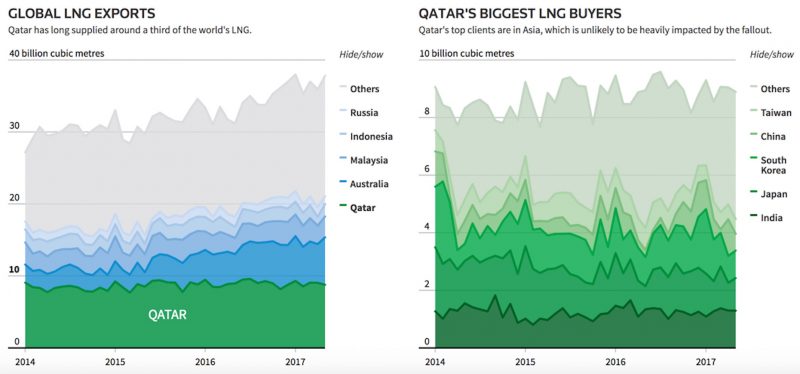- Bahrain, Saudi Arabia, Egypt, and the United Arab Emirates severed diplomatic relations with Qatar, accusing it of supporting Islamist terrorist groups and Iran. They cut transport links, making it difficult for the country to import and export goods. Citizens are worried about food shortages. Qatar is one of the richest countries in the world and can protect its banks – but there are reports of deals being put on hold and investors looking to pull out money altogether. The socioeconomic impact is already hitting hard – and it has only been three days since the announcement.
Qatar’s unprecedented slide into a potential socioeconomic death spiral started almost immediately after Bahrain, Saudi Arabia, Egypt, and the United Arab Emirates severed diplomatic relations with the country, which they accused of supporting Islamist terrorist groups and Iran.
While Qatar denies the accusations, relations are now so strained between the powerful Arab states that not only are diplomatic relations suffering, but key transport links are already being severed, and the economy is starting to feel the squeeze.
The UAE essentially just made it illegal for citizens to feel sorry for what is happening to Qatar. The UAE-based newspaper Gulf News and the pan-Arab channel Al Arabiya reported that the UAE had barred people from publishing expressions of sympathy toward Qatar.
The punishment? As much as 15 years imprisonment and a minimum fine of 500,000 dirhams (£105,446 or $136,115). UAE Attorney-General Hamad Saif al-Shamsi told Gulf News:
"Strict and firm action will be taken against anyone who shows sympathy or any form of bias towards Qatar, or against anyone who objects to the position of the United Arab Emirates, whether it be through the means of social media, or any type of written, visual or verbal form."
Qatar is one of the richest countries in the world - but that doesn't matter
Qatar is one of the richest nations on the planet by gross domestic product per capita. It is the 18th-most-competitive country, according to the World Economic Forum's benchmark Global Competitiveness Report.
It is a small nation of just 2.4 million people, most of whom are foreign workers.

Its macroeconomic environment is so stable that only Norway beats it in WEF's rankings:

The fact that Qatar is so rich and powerful may make it seem as if it would be difficult to rupture the country's economy. After all, Qatar is a huge contributor to the world's supply of liquefied natural gas, and its biggest LNG buyers are not Arab states.

But there is already tangible proof that the country is being badly affected by the cutting of ties - both on social and economic levels.
The immediate social and economic impacts on Qatar

The sudden severance of ties between Qatar and powerful Arab states was not just a huge shock to foreign relations; it was also a terrifying blow for those living and working there.
Over the past few days, we have seen panic spread across several sectors and costs mount up in a clutch of areas:
1. Shipping
2. Food
3. Airlines
4. Banking
5. Stocks
Qatar is a huge import country, especially for perishable goods (mainly food). Qatar imports mainly from the US and Germany but also from Saudi Arabia.

Here is the monthly data in US dollars showing the trade balance of Saudi Arabia, Egypt, Bahrain, and UAE with Qatar:

When the ties were severed, people in Qatar started panicking that the country could run out of food. Qatari authorities had to stop people from raiding supermarkets, which were all replenished Tuesday.
Qatar normally imports food through its land link with Saudi Arabia. So while Qatar can still buy perishables from the US, it will now face difficulty physically getting the goods to the country.
Dubai, part of the UAE, is also massively important for the import and export of goods because of its huge port Jebel Ali.

The world's largest container-shipping line, Maersk, said in a statement to Reuters on Tuesday: "We have confirmation that we will not be able to move Qatar cargo in and out of Jebel Ali."
It added that it was looking for alternative routes. These changes will delay shipments and could carry a greater cost burden - one that has not been officially calculated yet.
And in addition to the land and sea links, air routes may be affected as well.
As my colleague Benjamin Zhang pointed out, "Qatar actually has very little airspace relative to the size of the country." He cited a CAPA Center for Aviation report that said, "Losing Saudi, Bahrain, and UAE airspace would effectively ground Qatar Airways," the Qatari airline.
"It is largely surrounded by Bahrain airspace (the Bahrain FIR), a slither on the south is managed by Saudi Arabia while the UAE is on the eastern border."
Bahrain, Saudi Arabia, and the UAE are seeking to barQatar Airways from their airspace, and a map here shows how devastating that could be for Qatar.
Financials are suffering and wider economic impact could be terrible

Qatar has the world's third-largest reserves of natural gas. But as Euromonitor Insights said in a report sent to Business Insider, it "borrowed heavily to fund export facilities that would chill the gas into liquids which allow the country to export to previously unreachable markets in Asia, Europe and the USA."
With the four powerful Arab states cutting transport ties, LNG shipments could become more expensive and therefore less economically competitive.
The economic impact could hit jobs if it continues in the coming days. "The country's oil and gas industries employ the greater part of the active workforce, accounting for well over 90% of export revenues and 50% of GDP," Euromonitor Insights' report says.
The financial system is also feeling the heat.
Reuters reported on Wednesday that "some banks from Saudi Arabia, the United Arab Emirates and Bahrain delayed letters of credit and other deals with Qatari banks after their governments cut diplomatic ties and transport links with Doha on Monday."
The Financial Times also said, "Saudi banks are already looking to sell off their loan exposure to Qatari lenders."
This is making markets volatile. The Qatari riyal on Tuesday fell to its lowest level since June 2016 against the US dollar - though it has since recouped losses and is near its official peg of 3.64 to the dollar.
The FTSE Nasdaq Qatar 10, which tracks the biggest companies in the country, has dropped by 8.2% since the announcement.

All that has happened over just three days.
Yes, Qatar is one of the richest nations in the world. It has incredible financial firepower to protect its banks: It earns billions of dollars a month in gas exports and has $335 billion of assets in its sovereign wealth fund. But people are still wondering whether investors pulling out might start a run on Qatari banks.
After just three days, there is already a tangible, detrimental impact on its economy. The curbs on transportation freedom it enjoyed with its neighbours is a huge deal, and the foreign-relations fallout has only just begun.
Qatar is an economic Goliath, but even giants can be felled.

